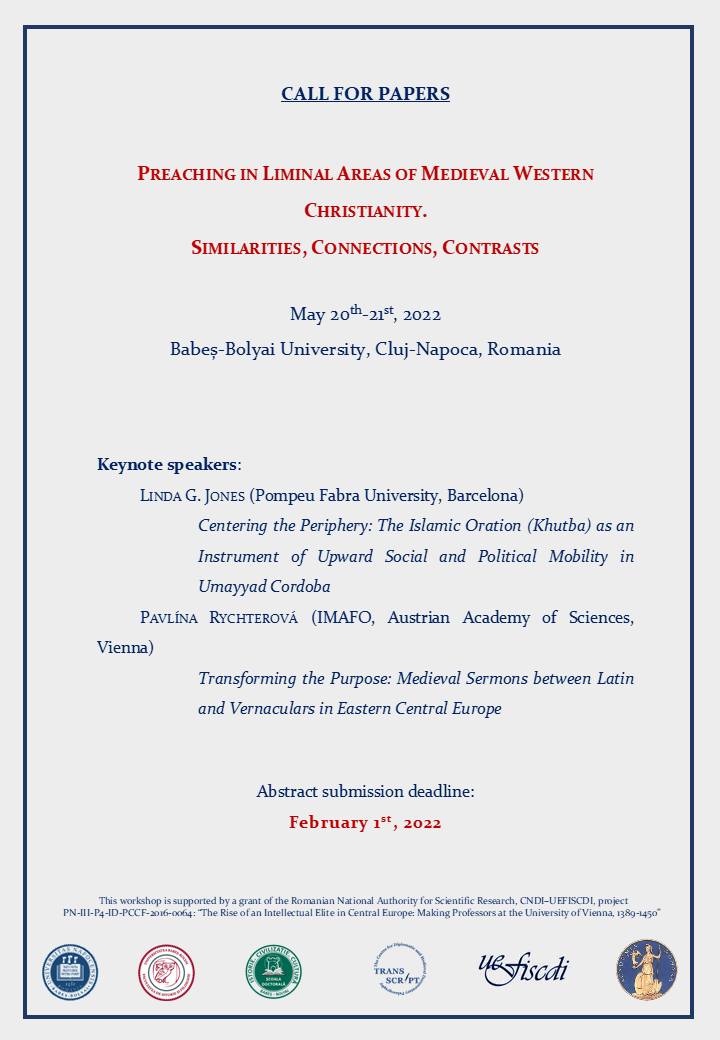CALL FOR PAPERS
ARGUMENT
This exploratory workshop aims to discuss preaching texts (Christian, Muslim, Jewish) and their communication in several liminal spaces of the later medieval Western/Latin world in a comparative manner. Medieval preaching has been fruitfully studied as a means of inciting believers to lead a life according to their faith and as a channel of communication between religious agents and a larger lay public. However, it has been less explored from the perspective of institutional, intellectual, and social developments in ‘frontier’ areas, broadly construed as both geographical and cultural spaces, such as Iberia, Scandinavia, Eastern and South-Eastern Europe, the Eastern Mediterranean, the Baltic Rim.
These liminal, culturally fluid regions in which Latin (or ‘Western’) ‘Christianities’ were in constant contact and exchange not only with Slavic-Byzantine Orthodox traditions, but also with Muslims, Jews, and resisting pre-Christian beliefs, lend themselves to a comparative investigation that also considers various particular contexts, e.g. urban development, religious structures, political dynamics in place, the development of higher education, and so forth, as highly relevant aspects in the study of individual sermon texts or particular preaching contexts. In addition, preaching and sermon literature were complex witnesses of numerous societal changes to be scrutinized in relation to later medieval pastoral cultures. They could thus serve as ‘contrast agents’ for the examination of multiple historical phenomena. Furthermore, these textual testimonies can be examined from manifold perspectives and conceptual frameworks, such as sociology, cultural studies, and post-colonial theory, the concepts of ‘small cultures’, ‘knowledge communities’ or multilingualism.
TOPICS
Within this broader context, we propose to approach preaching in frontier spaces as a larger phenomenon that goes beyond the study of sermon texts in isolation, or of the sermon as a single communicative event.
The workshop addresses early career and established researchers who integrate the study of sermons and preaching in their scholarship. There are no imposed thematic or chronological boundaries and all perspectives of interrogating the medieval and early modern past that include sermon texts and their environment of creation, delivery and/or reception in the target areas are welcome. Possible topics and approaches that seek to analyse and contextualise preaching could be, but are not limited to:
- access to knowledge and the ‘material turn’, e.g., the materiality of the textual support of sermons and transmission of texts in their manuscript and printed form.
- impact of the emerging ‘book market’ around 1500 and the above-mentioned liminal landscapes of preaching.
- perspectives from book and library history.
- virtual reconstruction of old collections through provenance research or through recuperation of recycled fragments.
- history of education and history of knowledge.
- alternative sources for the history of preaching and preachers (other than sermon literature).
- prosopography and the social history of preachers.
- in-depth and inclusive discussions of miscellaneous manuscripts or printed compilations containing sermons and other texts, such as liturgical, legal, or historical works.
- theoretical perspectives on sermons and preaching.
All these considered, the goal of the workshop is twofold: to stimulate further comparative study of ‘fringes’ by expanding the geographical boundaries of the international research of sermons and preaching and, consequently, to better understand the cultural impact of preaching – perceived as a process of reception, local dialogue and adaptation – within particular late medieval societies.
ORGANIZATIONAL MATTERS
Babeș-Bolyai University and the «George Bariţiu» Institute for History of the Romanian Academy, both in Cluj-Napoca, Romania, serve jointly as host institutions of the workshop to be held over two days (May 20-21, 2022). Pandemic situation permitting, the meeting will take place in person; otherwise, it will be on-line or in a hybrid format. Free accommodation in Cluj-Napoca (19-22 May) and meals (20-21 May) are provided to all attendees.
The language of the workshop is English. It is the intention of the organizers to gather the individual contributions in a volume of collected papers to be printed by an international publishing house. We welcome proposals for papers from scholars of all career stages that engage with the themes of the conference. To participate, please submit a ca. 200-word abstract and 100-word academic biography to the organizing committee (see below) by February 1st, 2022. Notification of acceptance: February 15th, 2022.
Organizing committee: Adinel C. Dincă (Babeș-Bolyai University / Romanian Academy, Cluj-Napoca, adinel.dinca@ubbcluj.ro) and Lidia Negoi (Austrian Academy of Sciences, Vienna, lidia.negoi@oeaw.ac.at).
Please direct abstracts, CVs, and any queries to the abovementioned e-mail addresses.
